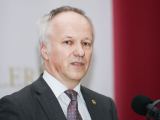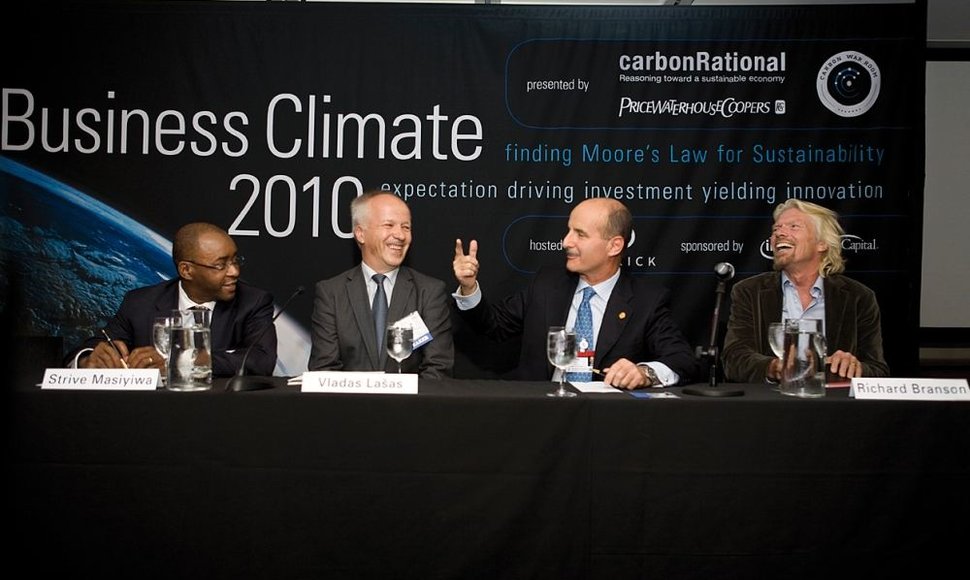Seven people each year are awarded for doing successful business that is also socially responsible and adhering to principles of social solidarity. 90 candidates from 60 countries were nominated for the third annual award from the Business for Peace Foundation, set up by the Nobel Peace Prize winners, and the International Chamber of Commerce. Besides the Lithuanian, the Business for Peace Award was given to businesspeople from Egypt, India, Argentina, the US, Tanzania, and Bangladesh. The award ceremony is due on 7 May in Oslo, Norway.
 |
| BFL/Tomo Lukšio nuotr./Vladas Lašas |
Among the previous laureates are leaders of world-class companies like Ikea, Tata, General Electric. The illustrious company is now joined by Lašas, head of Skubios siuntos, a shipment company established twenty years ago.
- You are the first Lithuanian businessman who has received such international recognition for your work. How does that make you feel?
- I'm very pleased and surprised. It doesn't sound very probable that what happens in Lithuania can get noticed when there are so many more significant things happening in the world. But, it appears, it is still worth gathering your strength and giving it a try. I can now imagine how an athlete who has won an Olympic medal for himself and his country should be feeling. This recognition comes from great co-workers, colleagues, teams that I am a member of.
- How did you switch from science to business?
- While rebuilding our state, I had to find a way to break out of the Soviet postal service so I could send mail to international conferences and receive things on time and not after six months. I convinced a few friends and we sent out twelve shipments to world Lithuanian communities with editions of 13 March papers that printed the Independence Act of 11 March. It was a symbolic start testing the only gateway of the time – the Sheremetyev Airport (in Moscow). We later discovered faster routes via Finland and after that – Germany. This year marks the 21st anniversary of our official contract with UPS.
- But that is surely not enough to land a Business for Peace Award?
- Merely doing business would not suffice to draw attention, but my colleagues and I are trying to do it creatively, with passion. What me and Vytautas Jokužys did in university, we are now continuing to do in our company Elinta (which provides solutions for industry automation and electric cars).
Several years ago, I met Richard Branson (British businessman, founder of Virgin Group) in California. The encounter has developed into a nice cooperation on founding a non-profit organization Carbon War Room that aims at using new technologies and available finances to set up and promote sustainable and profitable green businesses.
This effort has caught the attention of the award committee. It also noted my other work. I participate myself and invite others to participate in TED conference (the event, founded in 1984, is dedicated to “ideas worth spreading,” as its slogan goes) that I'm a member and a sponsor of. Together with British businesspeople, we've established Sprinboard, an accelerator program for business startups, significance of which extends beyond Lithuania and the UK into entire Europe. Several years ago, we started holding Startup Weekend and Startup Monthly Vilnius events. They were organized by active young people.
- What is it exactly that Carbon War Room does?
- In great part, change does not come about because we do not believe it is possible. However, by including young people with ambitious and innovative ideas in, for instance, energy, we can achieve a breakthrough like the one that happened in computing twenty years ago. There were young people – Bill Gates or Steve Jobs – who changed everything.
New opportunities out there now have to do with energy and natural resources. The problem of climate change is seen as the greatest opportunity of our time for the advent of more efficient and better technology. Climate change can be a source of creating value, wealth – it only takes to use the things we've already got in the right way.
We can cut current CO2 emission levels by 50 percent using only existing technologies. Last year, Google, an IT company, invested 900 million US dollars into renewable energy technologies.
We, as a non-profit org, served as a catalyst in connecting technology, finance, and municipal institutions in several US cities that launched a multi-billion-dollar energy efficiency project or, as they say it here, a renovation.
We look for obstacles preventing us from using existing technologies to cut CO2 emissions as well as for best ways to overcome them. Oftentimes, financing goes the wrong way, we invest into traditional and long-established areas, failing to see how fast they are changing. Let's remember the case of (Panevėžys-based TV-set producing company) Ekranas. Its bosses believed that kinescopes would continue to be in demand for a decade longer, but the company went bankrupt after several years.
- You are not only interested in change on Earth, but in space as well. What do you see out there?
- I am happy that our company (Skubios siuntos) has nurtured several excellent leaders whom I've trusted running the company with. I, meanwhile, am looking for areas where I could lay foundations for future work. Together with like-minded people, we started looking at space. It has been calculated,that even today one orbital flight, connecting most distant places on earth, would be very useful.
Lithuania has enough minds and hands to take part in valuable space programs. A kilo of a space product and a kilo of a car or piece of electronics have very different values. We should better participate in exceptionally valuable projects. Granted, it carries great risks, because not all ventures end successfully, but we – as a small country and a young business – are much better prepared for taking risks. Those with long histories, protecting their invented models and infrastructures, find changing something much more difficult.
- In your shipment company, Skubios siuntos, you've introduced the system “Decide your own salary.” How does that work?
- It's not a system for everyday use. We had our first go with it before the recession. We saw that business was growing, so salaries should too. I came to my colleagues with a proposal: instead of hiring a consultancy firm to carry out an analysis on how much a Lithuanian employee should earn, why don't we let them evaluate their own work. Employees had to answer five questions. One of them was how much they wanted to make.
It's interesting to recall that, 20 years ago, a perfectly normal monthly salary was 50 US dollars.
I've made a proposal to the prime minister – why don't we, as citizens, leaders, and institutions, determine our own tax rates for five years. Taxes are the common good that everyone wants from the state. If they are used efficiently, everyone will want to contribute. Even though it sounds utopic, but it is achievable, if we lay certain rules. However, the case with taxes just like with salaries is that you cannot decide for yourself the amount of what you do not have.












